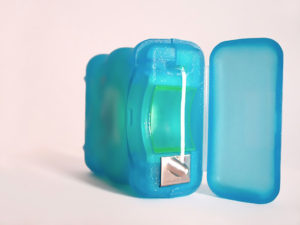Dentist Near Me
 The year is closing and holidays are on the horizon. Are you planning year-end travel or a last-minute getaway? Before heading out on your next adventure, make sure you are prepared with these 3 quick tips for maintaining optimal dental health during travel.
The year is closing and holidays are on the horizon. Are you planning year-end travel or a last-minute getaway? Before heading out on your next adventure, make sure you are prepared with these 3 quick tips for maintaining optimal dental health during travel.
- Properly transport your toothbrush. Instead of throwing your toothbrush into a bag with the rest of your toiletries, use a resealable plastic bag. This can reduce the amount of bacteria that gets passed on to your toothbrush.
- Pack sugarless gum. Gum can help relieve ear pressure during a flight and prevent dry mouth that can occur during travel. Research shows that chewing sugarless gum for 20 minutes after a meal can also help prevent tooth decay.
- Brush with bottled water. If you are in another country or on a camping trip in the wilds, use bottled water to brush your teeth. This can reduce your risk of getting sick due to unfamiliar bacteria or other contaminants in the local water.
If you are taking a vacation before the year ends, don’t forget to take steps to maintain optimal oral health while you are away. Don’t forget to pack our office number in case you have questions about your oral health during your trip, then schedule an exam and cleaning for after your return.
DiChristofano & DiChristofano Dental Care
7615 W Montrose Ave, Norridge, IL 60706
(708) 453-0777




 Loose teeth, bad breath, and painful, bloody gums – these are among the signs and symptoms of periodontal, or gum, disease. Unfortunately, periodontal disease can also begin without any obvious symptoms. If left undiagnosed or untreated, you could be at risk for irreparable damage to your teeth and gums. The good news is that periodontal disease is preventable. In fact, one of the most effective tools for preventing the disease only takes a minute of your time each day.
Loose teeth, bad breath, and painful, bloody gums – these are among the signs and symptoms of periodontal, or gum, disease. Unfortunately, periodontal disease can also begin without any obvious symptoms. If left undiagnosed or untreated, you could be at risk for irreparable damage to your teeth and gums. The good news is that periodontal disease is preventable. In fact, one of the most effective tools for preventing the disease only takes a minute of your time each day. Mouthwash can be helpful in decreasing the amount of bacteria in your mouth. It can also be a useful way of combating decay. But not everyone needs to use a mouthwash. If you are wondering whether you should be using a mouthwash, here’s what you need to know.
Mouthwash can be helpful in decreasing the amount of bacteria in your mouth. It can also be a useful way of combating decay. But not everyone needs to use a mouthwash. If you are wondering whether you should be using a mouthwash, here’s what you need to know. No time to brush or floss your teeth? When brushing or flossing isn’t convenient, you can still keep your mouth feeling fresh by eating certain foods. When you’re on the go or in a hurry, try grabbing one of these foods to munch on to help fight plaque and keep your teeth healthy.
No time to brush or floss your teeth? When brushing or flossing isn’t convenient, you can still keep your mouth feeling fresh by eating certain foods. When you’re on the go or in a hurry, try grabbing one of these foods to munch on to help fight plaque and keep your teeth healthy.